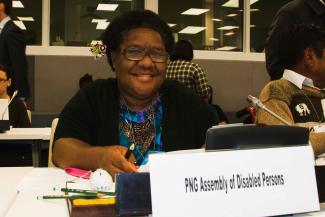
Ipul Powesau is co-chair of the Papua New Guinea Assembly of Disabled Persons and member of the Indigenous Persons with Disabilities Global Network, which is a part of the Disability Caucus of the UN Permanent Forum on Indigenous Issues.
In 2012, the Disability Rights Advocacy Fund recognized that many of its grantees were Indigenous persons with disabilities from various regions of the world. Seven Indigenous leaders from the global south were invited to attend the UN Permanent Forum on Indigenous Issues, and I was one of those seven. Three of us came from the Pacific, two from Latin American, and one from Asia. We had a side event and it started the thought about developing a disability caucus under UNPFII. In 2013 a study [was] undertaken by the UNPFII looking at the situations of Indigenous persons with disabilities; I actually co-presented that report. The issues facing Indigenous persons with disabilities are similar. We are further marginalized because the issues with Indigenous people are still strong issues. That intersection of discrimination is pushing us further to the periphery, and we recognize that in order for our issues to be heard at these events, we need to form this network around the world.
We are being funded by the Disability Rights Fund. If the Disability Rights Fund has other priorities, then we are going to be looking for funding. And so those are our challenges. The other challenge is communication. The issue of language; the issue of time differences, it’s been a big challenge for us. That’s not stopping us. We now have members from the African region, Asia, Latin America, the Pacific, North America, and Nordic countries as well. We would like to build bridges with Indigenous people, walk together and leave no one behind. That’s what we would like to see. We recognize if we can talk together as one in one global voice, our voices will be heard louder. With one big voice and having this big stone thrown into the ocean creating this big ripple effect, we know that we will make a difference.
I’ve recognized that having access to an education has made it easier for me. Understanding the government system, understanding the cultural system and looking at how we can build bridges—if we don’t have access to education that’s a big challenge. Indigenous persons with disabilities will continue to be marginalized. We are advocating for access to education for Indigenous persons with disabilities, particularly children with disabilities. In my country I am a great advocate. You know, a lot of our governments have signed on to the human rights conventions. I keep reminding the government of their legal obligations; they cannot do this thing alone, that we need to work together. Persons with disabilities have a global motto: “Nothing About Us, Without Us.” If we want to advocate for the rights of persons with disabilities, we as persons disabilities, we know our issues. People cannot pretend to say that the government will do it for us. We really need to work together, to sit together at the same table, and discuss the issue together.
We are people of the land; the land is a part of our life. You cannot separate people from the land, the seas, the mountains that we live in. When I look at the sky and I see the sun shining . . . our ancestors used to tell us that when you see the clouds forming this way it’s going to be either a strong wind a nice soft breeze. Today we have lost that [way of] looking at nature. [But] if we hold hands together we can help Mother Nature to still point us to where we all can go to. My word of advice is know Mother Nature. If we make Mother Nature angry, it will retaliate against us. But let’s work together, walk, and live with Mother Nature. We are advocating for the same issues, [so] let’s join hands together, let’s walk together. And let’s make the world a better place for us to live in.
Photo : Ipul Powesau from Papua New Guinea speaking at the UNPFII in 2013. Photo courtesy of the Disability Rights Fund.
